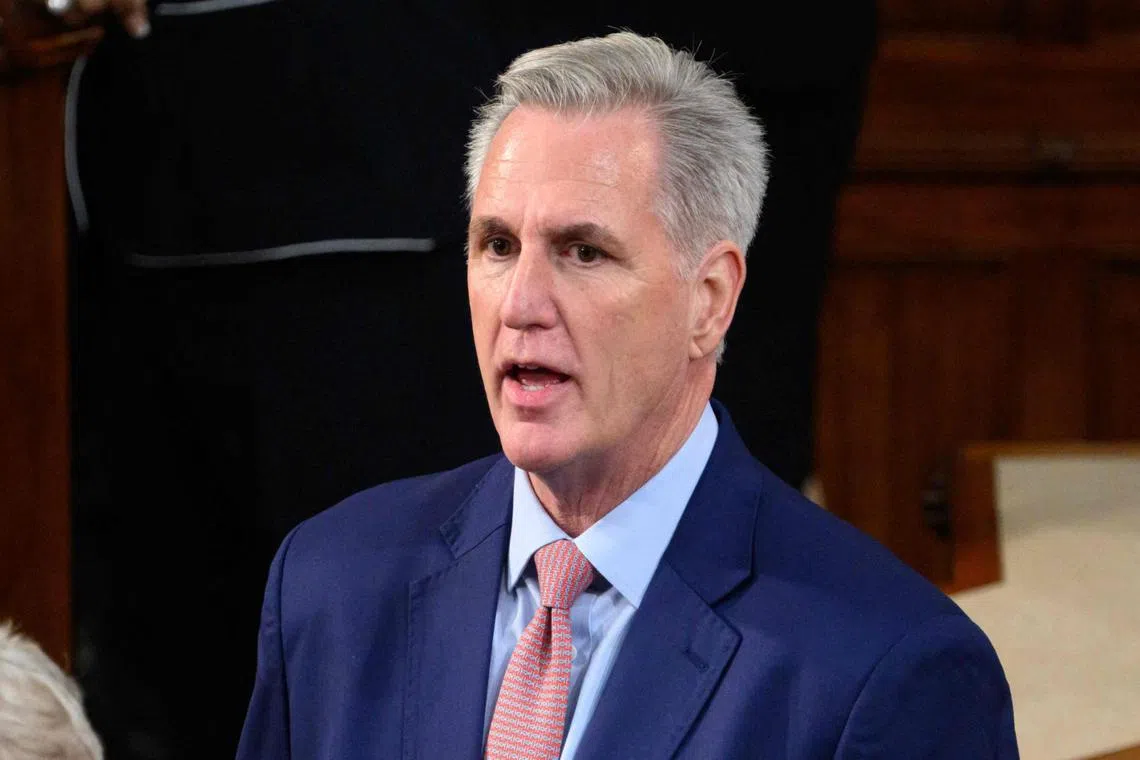Republican disunity over choice of Speaker leaves US House of Representatives in limbo
Sign up now: Get ST's newsletters delivered to your inbox

Republican leader Kevin McCarthy failed to win the vote of the simple majority of the chamber.
PHOTO: AFP
Follow topic:
WASHINGTON — The top post in the United States House of Representatives was left vacant on Tuesday as the legislative body adjourned after failing to choose a Speaker over three rounds of voting, leaving it unable to govern until the impasse is broken.
Republican leader Kevin McCarthy failed to win the vote of a simple majority in the Chamber,
This stark display of internal disunity made for an awkward start to the Republicans’ first day in control of the House, highlighting the deep division between the party’s more moderate wing and a hardline faction mostly aligned with former president Donald Trump.
It also underscored how the party’s slim majority of 222 to 212 may enable a few of its lawmakers to hold up proceedings going forward.
The House is currently in institutional gridlock. Without a Speaker, House representatives cannot be sworn in, and the Chamber cannot do any work, including considering Bills or assigning members to committees.
Tuesday’s speakership drama is rare. It is the first time since 1923 that the House has failed to elect a Speaker in the first ballot – a century ago, a similar disagreement took nine rounds of voting to resolve.
In 1856, the speakership was decided only after 133 ballots in a process that lasted two months.
The House will convene again at noon on Wednesday (1am on Thursday, Singapore time) to continue voting.
Mr McCarthy has vowed not to back down – but so have his opponents, which means that the House will keep voting until a Speaker is chosen. To succeed, he needs 218 votes if all the House’s 435 members are present and voting, and can afford only four defections from Republicans.
Theoretically, some Democrats could cross the aisle and vote for him, but none has signalled any intention of making such a move.
Likewise, the Democrats’ choice of Speaker, Mr Hakeem Jeffries, is unlikely to win over votes from Republicans.
The likely way forward would be for the holdout Republicans to change their minds, possibly following discussions with Mr McCarthy. They have said he is not conservative enough to lead the party and are demanding changes in exchange for their support.
But Mr McCarthy has already agreed to some, such as allowing a vote at any time to oust the Speaker and forming a sub-committee to investigate the Biden administration’s “weaponisation of the federal government”.
He said before Tuesday’s vote that he would not make further concessions.
Democrats, who have rallied unanimously around Mr Jeffries as their choice for Speaker, have made hay by drawing contrasts between their unity and the conflict in the Republican camp.
“We’re ready, willing and able to get to work on behalf of the American people, but we don’t have a partner on the other side of the aisle, because the Republican Conference has apparently been taken over by extreme Maga (Make America Great Again) Republicans,” Mr Jeffries said at a press conference, referring to pro-Trump Republicans.
“And to the extent there are reasonable individuals on the other side of the aisle, they have no way out,” he added.
Some Republicans were frustrated by their colleagues, slamming them for damaging the party’s image or for being more interested in opposing than governing.
“If the base only understood that 19 Republicans voting against McCarthy are playing Russian roulette with our hard-earned Republican majority right now,” conservative lawmaker Marjorie Taylor Greene said on Twitter.
“This is the worst thing that could possibly happen.”
Analysts said the fight over the speakership showed how divided the Republican majority is, and that their dysfunction from day one is a portent of the difficulties they would likely face governing in the next two years.
“If the majority can’t agree on a Speaker on day one, just think how fraught the next two years of this House are going to be, legislatively,” political analyst and Cook Political Report senior editor Dave Wasserman wrote on Twitter.

